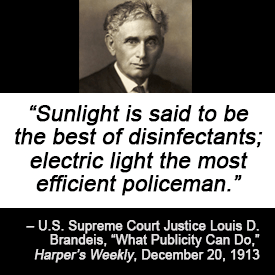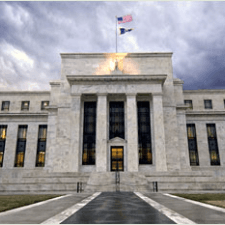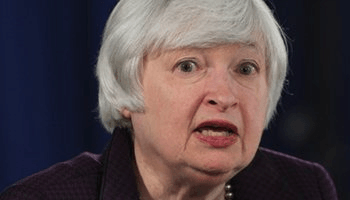Is the Audit the Fed Movement Losing Momentum?
Americans have almost no knowledge of the Federal Reserve yet, it impacts their financial lives every single day.
The origins and operations of the central bank are mysteries to most people, including most politicians.
Top Fed officials and their allies aim to keep it that way by defeating Audit the Fed legislation now pending in the U.S. Senate.
Back in 2010, the Audit the Fed campaign started gaining real traction in Congress. What had been for many years a lonely battle for transparency waged by former Rep. Ron Paul (R-TX) finally reached a critical mass of support. Congressman Paul’s signature Federal Reserve Transparency Act seemed to stand a real chance of passing.
But Federal Reserve officials weren’t going to stand for a Congressionally mandated audit of their books and their interest rate machinations. Sensing a real threat to their power, they pressured pliable members of Congress to back down.
The Audit the Fed movement drew support from both Congressional conservatives as well left-wing legislators, including Senator (and current challenger to Hillary Clinton in the Democratic primaries) Bernie Sanders (S-VT).
The prominent socialist bolted when it came time to counting the votes for a full audit of the Federal Reserve. Instead of backing Ron Paul’s full audit, which the Fed didn’t want, Senator Sanders introduced an amendment that effectively gutted the audit and gave the Fed new regulatory powers.
Big Banks and Fed Governors Have an Unholy Alliance
Fast-forward to 2015, and Audit the Fed legislation that passed the House of Representatives once again faces the threat of being sabotaged in the Senate.
The Federal Reserve’s lobbying power shouldn’t be underestimated. Because it relies on the Fed for bailouts and below market borrowings, the entire banking system makes it its business to stay in bed with the Fed and its political allies on Capitol Hill. Financial institutions from Goldman Sachs to the too-big-to-fail banks are the biggest contributors to both Republican and Democrat campaigns.
Even the Senate’s leading populist critic of Wall Street and the big banks, Elizabeth Warren, doesn’t want the people to know what the Federal Reserve is doing behind closed doors. Senator Warren said that an audit of the Fed’s monetary policy deliberations “risks politicizing those decisions and may have dangerous implications for financial stability and the health of the global economy.”
Warren’s objection to a Fed audit is strikingly similar to Fed chair Janet Yellen’s. Yellen said subjecting the central bank to an audit would “politicize monetary policy” and “bring short-term political pressures to bear.”
Ironically, it was short-term political pressures that caused President Obama to nominate Yellen for Fed chair instead of Larry Summers (who was deemed insufficiently leftist by some Democrats in Congress). And short-term political pressures were certainly brought to bear on the Fed last month when it refrained from raising its benchmark interest rate which has hovered near zero for seven years.
Prominent politicians including Ohio Senator Sherrod Brown strongly urged the Fed to hold rates down at historic lows. He got what he wanted. Now Fed operatives expect Sherrod Brown to give them what they want: a strong “no” on Audit the Fed. Senator Brown happens to be the top-ranking Democrat on the Senate Banking Committee. He is in a position to make or break Audit the Fed legislation.
Even though the bill passed overwhelmingly in the House last year, it now faces roadblocks to getting the 60-vote filibuster-proof majority it will need to head to President Obama’s desk (where it would likely be vetoed). Fed officials may claim they are non-political, but they sure do know how to play politics when it comes to defeating legislation that threatens their self-serving institutional interests.
Fed Governors Play Politics with the Economy and Asset Prices
When Fed chair Janet Yellen insists (with a straight face) that the Fed needs to remain independent from politics, she is herself engaging in politics. The truth is that the Fed never has been “independent” from politics – just unaccountable for its politics.
The Fed’s privileges of secrecy don’t make its policymakers more enlightened and objective – just more insulated from accountability and more prone to corruption.
 Of course, the Fed isn’t an actual government agency. The Federal Reserve System is a government-sponsored cartel of private member banks. Fed policymakers serve the interests of these private bankers even as they claim to be doing a public service (with a dual mandate of full employment and price stability).
Of course, the Fed isn’t an actual government agency. The Federal Reserve System is a government-sponsored cartel of private member banks. Fed policymakers serve the interests of these private bankers even as they claim to be doing a public service (with a dual mandate of full employment and price stability).
Fed officials just don’t want us to be able to make an informed determination as to whether the Federal Reserve actually acts in the public interest.
Our Constitution doesn’t allow for the installation of unaccountable philosopher-kings to set interest rates, rig markets, and create money at will.
Which institutions has the Fed secretly bailed out? What is the Fed’s role in implementing secret policies crafted by the President’s Working Group on Financial Markets (a.k.a., Plunge Protection Team)? To what extent does the Fed collude with other central banks to implement global policy objectives? How much actual physical gold does the Federal Reserve own (that hasn’t been leased out)?
The public deserves real answers to these and other questions. Sunlight is the best disinfectant. And while Audit the Fed legislation wouldn’t, by itself, strip the Federal Reserve of its immense powers, it would shine some much-needed light on the secret doings of central bankers.
The Fed has successfully resisted opening up its books so far. But even if it the Audit the Fed bill dies in the current Senate, the issue isn’t going away. Voters have awoken to the need for Fed transparency. And the Fed’s insistence that it maintains its secrecy is yet another red flag. The movement to audit the Fed will not be stopped.


